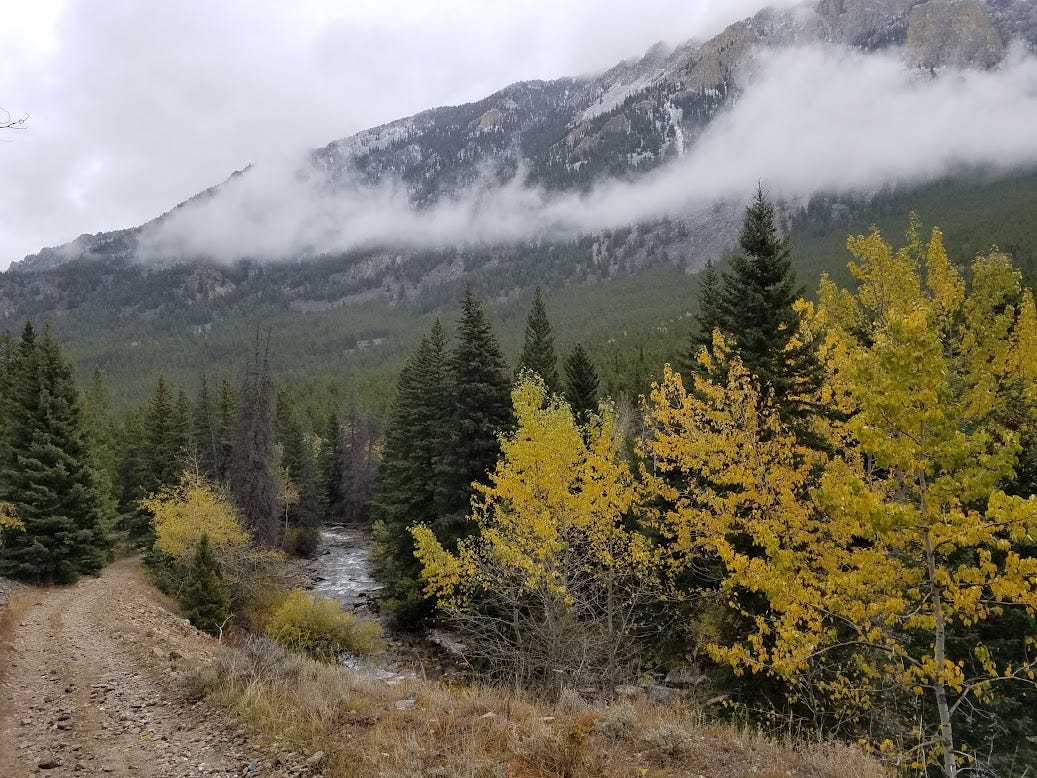Natural Stories: The memoir version
In which our hero tells a story that involves the meaning of "nature writing"
Rather than a manifesto, here’s the story of how I came to write this newsletter.
Last June, I was asked to give a lecture at a local historical museum. It was an awkward space, wide but shallow, the folding chairs crowding up to the stage-area. I stood off to the right as the the emcee introduced me. When she used the word “naturalist,” I was flabbergasted.
I can’t be a naturalist: I don’t know the names of flowers or rocks or fish or the bugs they eat. I don’t know mammals by their tracks. I don’t know birds by their songs or their plumage. (I hardly ever use the word “plumage” except as a Monty Python reference.) I never took a course in ecology—never took any college classes in the natural sciences. I don’t belong to any national environmental advocacy organizations, have never testified for or against a bill at the legislature. I do like to walk, and because I live in a small town in Montana, most of my walks involve natural surroundings. But I’m not particularly good at noticing them. For example, I enjoy the smell of a pine forest, or of the earth after a rain (“petrichor”!), but I too rarely notice the subtler changes in aroma that signify… something, I’m sure, but I don’t know what.
Call me a writer, I silently scolded the emcee, not a naturalist. I’m not even a nature writer! Nature writing always intimidated me. It was full of vocabulary words, nonhuman actors, and navel gazing. For example, shortly after I moved to Montana and started spending a lot of time outdoors, my parents gave me a book they thought I would love. It was about nature’s influences on my father’s favorite poet; an English professor had visited places that had inspired famous poems. It was the most boring damned book I have ever tried to read. There was no narrative tension. There was no added lyricism. There was scholarship, I guess, but no personality. I’ve always loved Roy Blount, jr.’s line about how being a book-lover studying English in graduate school was like being a young heterosexual male “learning about women at the Mayo Clinic.” That was how I felt about learning about nature by reading much nature writing.
Other writers have felt the same way. For example, Edward Abbey said that he was a nature lover. “I did not mean to be mistaken for a nature writer. I never wanted to be anything but a writer, period.” Meanwhile, Marjory Stoneman Douglas wrote to a Wellesley College committee that was trying to give her a nature writing award, “I am not a nature writer. I am a similar breed, but not quite the same.” She wrote about people and regional culture, she said. She was willing to be called a regionalist (a label that many of my writer-friends abhor) but not a nature writer. Even Bill McKibben, one of the world’s leading climate activists, “is not primarily a nature writer,” one critic wrote. “Nature is a means to his larger end: the exploration of the meaning of being human.”
Me too. Being human, that’s what I write about! Although I don’t usually phrase it that way. I call myself a journalist. I ask people about their stories, and write them down. Granted, I do seem to gravitate towards stories about people who have intense relationships to nature. From Caroline Lockhart to John Muir, I’ve been fascinated by the quests of people whose interactions with their natural surroundings drive their identity.
At the museum, I recovered in time to thank the emcee. I tried to say that I was flattered to think that my writing about people in glorious natural settings implied I knew something about nature. After all, humans are part of nature. I aspire to know something about humans. I want to tell their stories.
Does this qualify as nature writing? I don’t want to get into semantic disputes. I just want to tell natural stories. Sometimes nature is an overwhelming force in these stories. Sometimes it’s just contributing to the setting. And sometimes regardless of setting the stories just feel natural. True. Genuine. Human. Each week I’d like to publish another one.
That’s my story. Next week, we’ll get on with the stories of others. I hope you’ll come back.
Notes:
I’ve quoted Blount, jr., from Crackers: This Whole Many-angled Thing of Jimmy, More Carters, Ominous Little Animals, Sad Singing Women, My Daddy, and Me (Knopf, 1980).
I’ve quoted Abbey from the Preface to the 1988 reissue of his classic Desert Solitaire. For context (Abbey was, as usual, exaggerating), see James Cahalan’s biography Edward Abbey: A Life (U of Arizona Press, 2001), p. 242.
I’ve quoted Douglas from Jack E. Davis’s biography An Everglades Providence: Marjory Stoneman Douglas and the American Environmental Century (U. of Georgia Press, 2009), p. 323.




